Executives at Kayentis, a Philadelphia-based software provider for the pharmaceutical and health-care industry, have decided to continue their collaboration with Sprint, after experimenting with Sprint 3G/4G USB Modem U300 mobile broadband cards last year, in order to test the increased speeds the 4G services can deliver, the wireless carrier has recently announced. According to the company, Sprint 4G can offer the software provider the possibility to become a lot more efficient, responsive and valuable to its customers.
“Communicating by our North American executives with each other and with our pharmaceutical customers has been greatly improved with the use of the Sprint 3G/4G broadband cards,” Guy Maestre, vice president, North American Operations, Kayentis, said. “The new e-mail and data exchange speeds that we see when acquiring research data, RFP information, and accessing our applications in our central servers through the Web are truly remarkable.”
Present on 27 U.S. markets, the Sprint 4G technology offers top download speeds of over 10 Mbps, approximately ten times faster than the speeds of any 3G service offered today. The new 3G/4G service allows users to access the Internet from about any place in the city, not being limited to a few hotspots, and also download files instantly. Sprint 4G has been providing wireless services in Philadelphia since Oct. 26, 2009.
According to the mobile-phone carrier, Sprint 4G will drastically reduce the time needed to transfer data-rich information, such as X-rays, vital facts or medical records in case of emergencies, as well as accelerate the approval of clinical trials for various pharmaceutical products, thus helping patients who wait for operating procedures or life-saving medicines.
“Sprint 4G will be a major shift in the way businesses use bandwidth-intensive mobile devices and offers a glimpse of the future of wireless technology for an eager market,” Todd Rowley, vice president, Sprint 4G, added. “Sprint 4G customers will enjoy a blazing-fast mobile broadband experience and much higher quality video conferencing, not to mention flexibility with IT spending by using 4G as a primary or backup connection rather than a wired T1, which costs more and takes longer to install.”
Sprint was the first wireless carrier to test, launch and market 4G services in the US, and plans to introduce this technology on other markets around the country, including San Francisco, Boston, Washington D.C., Houston or New York.

 14 DAY TRIAL //
14 DAY TRIAL //